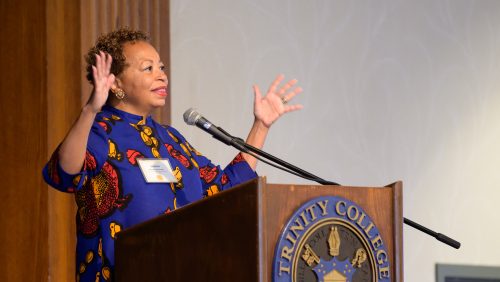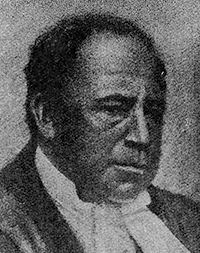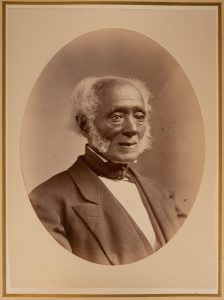A Tale of Two Black Men around the Time of the College’s Founding

President Joanne Berger-Sweeney shared what she has learned about two Black men who are important to Trinity’s history during a Bicentennial event held in conjunction with the Institute for Cross-Cultural Awareness and Transformative Education on November 18, 2023. The president was one of several speakers at the event commemorating The Reverend Edward Jones, who received an honorary degree in 1830. Her edited remarks are below.
This is a tale of two gentlemen, two Black Americans, who helped shape the founding of Trinity College in 1823. Their stories, very different but with a few similarities, are a part of the rich history of the College.
As a part of Trinity’s Bicentennial, I wanted to learn more about the context of Trinity’s founding and its relationship to slavery. I sponsored the Primus Project to help us all better understand the extensive, rich, and complex history of the College in its first half century. When two alumni shared the stories of these remarkable men with me within the same week, I felt compelled to learn more.
James Williams was the janitor and bell ringer for the first 50 years of the College’s existence. He was lovingly and controversially referred to as “Professor Jim.” The Reverend Edward Jones was the first recorded Black postsecondary graduate in Connecticut, having received an honorary master’s degree from Trinity just seven years after the College’s founding.
Both are key figures in Trinity’s past, and both histories should be recognized to understand the foundation upon which the College was built. These stories also are illustrative of the conflicting perceptions of Blacks in America and underscore a complicated history and the complicated relationship that Black Americans have with this country we call home.
Edward Jones received an honorary master’s degree from Trinity in 1830. That was a quarter century before the first Black graduate from Yale College.

Jones was from Charleston, South Carolina, where his father owned a hotel that catered to whites. His father bought him freedom from slavery and Jones attended Amherst College in 1827 after, apparently, Amherst had to vote to allow him to matriculate. It seems that Blacks such as Jones were offered education from the Episcopal Church for a pledge to leave the United States and to “repatriate” to Africa.
The founder of Trinity College—originally called Washington College—was Thomas Church Brownell, who at the time also was the bishop of the Connecticut. Some in the Episcopal Church leadership supported the colonization movement, which proposed an end to slavery and the repatriation of Blacks from the United States to Africa. In support of these ideas, Brownell helped found the African Mission School in Hartford. Jones started at the African Mission School in 1829 and, when he graduated, was awarded an honorary master of arts from Washington College.
Jones had come to Connecticut in preparation for a career as an Episcopal missionary and educator. When he began his degree at Washington College, he apparently was not in classes with white students. According to published research, “Jones seemed to appear at night coming out from the back door; he didn’t appear in classes.” But Jones completed his studies.
And while he did not sign onto colonizationist ideas, he did decide to immigrate to Africa. As a missionary, Jones immigrated initially to Liberia and then to the Sierra Leone colony in 1831, where he served as a school master. A decade later, Jones became the first black principal—president—of Fourah Bay Institution, the first European-style college in West Africa. He served as principal at Fourah Bay College from 1841 to 1858.
Jones was described as hot tempered and “did not shrink from identifying those [European] missionaries who were particularly guilty of unkindness and objectionable behavior towards African subordinates.” His most outstanding quality was described as his scholarship. By all accounts, his knowledge of Africa was superior, and he would revel guests with small and large insights about the African continent.
Fourah Bay originally was intended as an Anglican missionary school to train teachers in the promotion of education and Christianity; it became a degree-granting institution through an affiliation with Durham University in 1876. As a result, students had the same curriculum and examinations at both institutions. The curriculum reflected the popular subjects of liberal arts institutions of the era: Latin, Greek, Hebrew, Arabic, history, natural science, French, and German.
As one of the few places in pre-Independence Africa to offer postsecondary education, Fourah Bay attracted sons and daughters of elite Africans from across the continent. Prominent graduates in the 19th and early 20th centuries included Bishop Samuel Ajayi Crowther, the first African bishop of the Anglican Church; J.E. Casely Hayford, an early advocate of education and self-rule for West Africans; and Henry Rawlingson Carr, a prominent Nigerian educator and administrator.
Following his retirement, Jones moved to England, where he died in 1865.

James Williams, or “Professor Jim,” as he was called by some, was the son of a French Creole slave and a Black freedman. Williams was born a slave and worked for Colonel John F. Robert of Yonkers. Robert happened to be a friend of Aaron Burr and reportedly housed Burr when he needed to lay low after his duel with Alexander Hamilton. Williams later said of Burr, he “was a short, rough and ugly man, who swore and cursed constantly, but who in ladies’ society was very polite and exquisite.”
Williams escaped slavery after his master died. He tended horses at an inn and became a sailor on British naval vessels during the War of 1812. On ships, he visited Spain, France, East Indies, China, Turkey, Greece, Africa, and South America. When he returned to the United States, Williams eventually found his way to Hartford to work for Brownell and his family about the time that the bishop founded Washington College. Whether Williams was Brownell’s slave or servant is not clear, but slavery was still legal in the State of Connecticut at the time of the College’s founding.
From the time Trinity began in 1823 and for the next 50 years, Williams served as the College’s janitor, bell ringer, and eventually head janitor. He was referred to as the “professor of ashes and secrets” because he knew so much about the secrets of the young men who enrolled.
Williams also knew of the mischief that the students would get into and was trusted not to report it to the authorities. He would enchant Trinity students with tales of his adventures as a young man and a sailor. According to his biographer, C.H. Proctor, a white student from the Class of 1873, Williams would provide orations at Class Day, which was likely equivalent to graduation day. One such oration was described in 1865 by a newspaper correspondent as “a mixture of Ethiopian wit, piety, and eloquence.”
At the end of every Class Day, the students would gather a purse of money to give to Williams, who worked for eight Trinity presidents. It was clear that “Professor Jim” was beloved and respected by Trinity students.
Proctor described Williams as “black as jet, grey-headed, good-looking and intelligent.” His biography concludes: “Long may his memory live with those to whom his name and face are most familiar. Wherever the graduate of Trinity goes, wherever the memory of Trinity College remains green, there we feel assured will linger a recollection of the Prince of College Janitors, PROFESSOR JIM.”
How do we reconcile these two histories of Blacks at Trinity around the time of its founding? Or for that matter, how do we reconcile these stories in America’s history? One Black man—born a slave—was serving as a janitor at the same time that another Black man—born free—received a degree and would be a key figure in pre-independence Africa.
Did they ever meet and interact? They must have encountered each other. How did white students reconcile these two images of Black men in America?
Whether we can reconcile these stories in our own minds, we at the very least must acknowledge that both stories are a part of the rich, complicated history of Trinity and Blacks in the United States, and we must acknowledge how they influenced life beyond America’s shores.
As a person of African descent, I care about our history at Trinity and share this complex history proudly with the world. It reminds me that we have the opportunity to write our own narrative about Trinity’s past and our role in it. We can help determine how we interpret this history in the context of both yesterday and today.
Trinity, and many other colleges, did not keep track of students by race until well into the 20th century. We do not know how many people of African descent attended Trinity between its founding and World War II. If we don’t count it, does it count?
How should we honor these pioneers—Edward Jones and James Williams—in this Bicentennial year? One of our alumni asked in an op-ed, how can “we ignore historic figures whose lives actually touch the very institutions where we cultivate the keepers of history?”
History is complicated. There is no black and white, good vs. evil. People are complex and must navigate complex times. In the words of Carol Moseley Braun, a former U.S. senator: “Defining myself, as opposed to being defined by others, is one of the most difficult challenges I face as a Black person.” Playwright and actor Lin-Manuel Miranda, whose award-winning musical Hamilton famously detailed the duel between Aaron Burr and Alexander Hamilton, put it differently: “Who lives, who dies, who tells your story”
References
For additional reading, see Charles H. Proctor’s Professor Jim; “Early College Staff,” Encyclopedia Trinitiana, accessed 2023; “Edward A. Jones,” Encyclopedia Trinitiana, accessed 2023; Robert Bruce Slater’s The Blacks Who First Entered the World of White Higher Education; Jehu Hanciles’ Euthanasia of a Mission: African Church Autonomy in a Colonial Context, C.H., and Douglas Kim’s “Profiles in Forgotten Courage.”